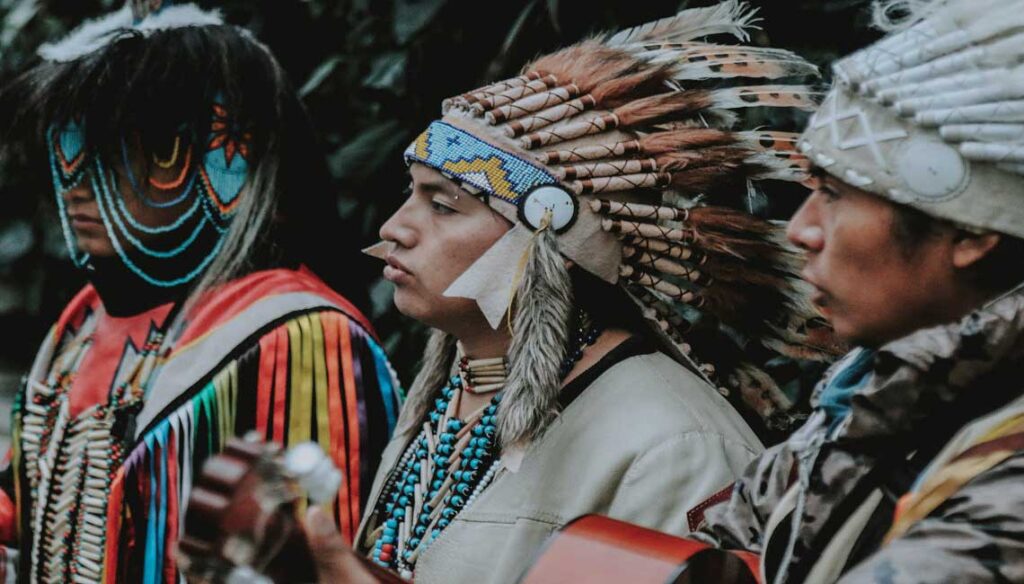
We’re not Indians and we’re not Native Americans.
John Trudell
We’re older than both concepts.
We’re the people,
we’re the human beings.
Before the European conquest and all known migrations, North America was home to dozens of ethnic groups with different traditions and languages, as well as a social structure with a political organization, economy, and spirituality based on a deep respect for nature.
They have been called the First Nations or Native Americans, and to this day their existence is recognized throughout the country. In Texas, since ancient times these nations were divided into Plains, Southeastern, Gulf, and Pueblo cultures. They have been characterized by their strong ties to the land they inhabit and maintain biodiversity, however, their history is marked by displacement and discrimination.
The political system, called reservations, refers to territories granted by the government, which have an identity, and economic and political rights. In Texas, three major reservations are recognized: Kikapu, Tigua, and Alabama-Coushatta, where more than twenty ethnic groups live; although there is also a large native population distributed throughout the state. Obtaining these rights has cost them years of struggle, in an effort to avoid being excluded from social development. The new generations have been integrated into the population that over the years has migrated to the United States, they are people of Hispanic origin from South America and other continents, and they exchange cultural traits, economic activities, and a shared history.
From the perspective of First Nations children, their development has been overshadowed since the time of the European conquest, when they were persecuted and enslaved. Because of the wars in the state of Texas during the 19th century and the economic advancement in the region, the territories originally inhabited by these children were occupied, and this limited their resources for survival in the following centuries, and they were forced to move.
For years, hundreds of children were taken away from their homes to live in residential schools, where they suffered abuses of all kinds with the purpose of changing their ancestral customs, language, and spirituality. For this reason, it is necessary to recognize their existence, and their culture, and above all to support the new generations so that they grow up with pride in their origins.
In order to expand our vision of diverse social groups, preserve the values of respect for cultural diversity, and strengthen the self-esteem of children of all backgrounds, we offer you the following #information tools:
- Did you know that the Native Americans managed to consolidate knowledge for the treatment of diseases and food production so that each ethnic group became an independent and self-sufficient nation.
- The stay in residential schools and discrimination caused serious damage to the mental and physical health of several generations of children, due to poor nutrition and mistreatment, so today hundreds of adults suffer from depression, addictions, diabetes, and cardiovascular disease.
- We share with you the work of Sean Sherman, called the Sioux Chef, to give back to the new generations the tradition of healthy food of the native peoples of America, and with this, recognize their identity and attack the problems of diseases that afflict the native community. Here you can learn a little more about his contributions.
- Mental health specialists have encouraged the healing of Native American childhood trauma by telling their stories in therapy sessions or through the media.
- We share with you the art of Tony Duncan, his music has soothing effects and transports us to the origins of this great nation.
- Let’s hear more about cultures different from our own. Children who grow up in environments where they are recognized and feel self-confident can develop all their abilities. On the contrary, a childhood full of hatred and denial has serious impacts on mental and physical health.
- Let us not forget the First Nations, let us not let their new generations suffer the adversities of the past, and let their cultural richness inspire us for a better common future.
At Del Pueblo Funeral Home we are interested in sharing the stories of the social groups that make up our diversity, all these people elevate the culture of our country. From childhood we can create an environment of peace and harmony, that is our purpose, so we remind you that we make easy the most difficult moments.
